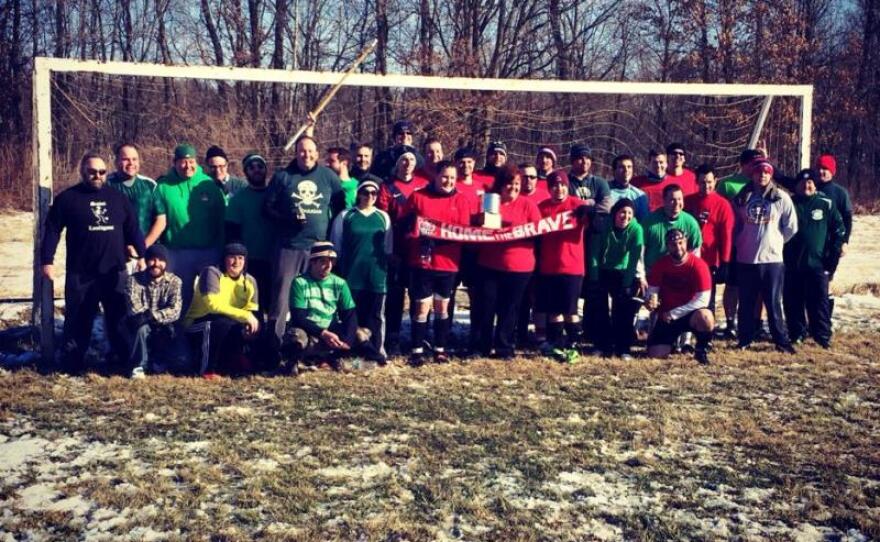It’s 10 a.m. on a Saturday and soccer fans fill the Amsterdam Tavern in south city, a bar known for opening before most people wake up on the weekend.
On this day three English Premier League matches are showing on mounted TVs, but the big attraction is Arsenal vs. Fulham. Nearly everyone has a beer in hand.
When Arsenal scores the bar erupts in cheers.
"Arsenal is pretty popular in this area," explains Mitch Morice, co-founder of the soccer supporter group the St. Louligans.
Morice has two scarves draped around his neck. One is the red, white and blue scarf of the American Outlaws, a die-hard group of U.S. soccer supporters. The other scarf is green and yellow with the signature St. Louligan skull and cross-bones.
The St. Louligans first came together in 2010 to support the city's short-lived, outdoor professional team, AC-St. Louis. When that club folded after just one season, Morice says the Louligans were the silver lining.
"There were people coming down here to watch the morning games, but they didn’t have anything local. There was nothing binding them together," Morice said. "... But we were all St. Louis fans for one year. Now it’s something for us to build on. So if we do get a pro team, it’s just going to be insane."
While Morice and other St. Louligans wait for a professional team to call St. Louis home, they still support amateur soccer, such as the St. LouisLions.
But getting a Major League Soccer team here is the Holy Grail.
Last month MLS Commissioner Don Garber dangled that possibility when he mentioned St. Louis among five cities being eyed for league expansion, along with Atlanta, Minneapolis, San Antonio, and Austin.
Garber has said the league's goal is to expand to 24 teams by 2020.
"[St. Louis] is the birthplace of soccer in America from what I’ve been told,” Garber said, following his State of the League address. "I live in the same town as Yogi Berra, and all he wants to do is talk about soccer, never the Yankees."
Garber paused to tell the room of New York reporters, "Yogi Berra is from St. Louis, folks."
It’s well known among St. Louisans that Berra grew up on The Hill, where Italian immigrants brought their love of soccer when they settled there more than a hundred years ago.
The neighborhood produced four of the five St. Louisans who played on the U.S. team that beat England in the 1950 World Cup.
According to Bill McDermott, there is no overstating the city’s contribution to American soccer. He should know. McDermott played soccer at St. Louis University and has spent more than four decades doing game broadcasts, including the three international matches held in St. Louis last year. Around town, he's known as "Mr. Soccer."
"Any newfound cachetthat perhaps the sport of soccer enjoys today in the United States is directly attributable to what the city of St. Louis started well over a century ago," he said.
McDermott says the huge turnout for those games proves the fan base is here. But getting an MLS team will require an investor with very deep pockets.
"It has become, for all intents and purposes, a billionaire’s club," McDermott said.
Expansion fees can cost more than $75 million. Investors for the New York FC paid a $100 million franchise fee, while Orlando SC paid $70 million. Both teams begin playing in the 2015 season.
MLS also requires a soccer-specific outdoor stadium, usually in an urban core. Webster University sports economist Patrick Rishe says those come with a hefty price tag.
"If you look at the cost of facilities that have been built recently, in particular Red Bull Arena (New Jersey) and Sporting Park (Kansas City), you’re talking about costs somewhere between $207 million and $235 million for a new soccer stadium," Rishe said.
Rishe says public funding is highly unlikely, especially considering that private funding paid for much of the Cardinals new stadium.
The St. Louligans are realistic about the financial hurdles.
Morice points to other cities that first looked to small pro teams then later landed an MLS team.
"If [we] have to go USL- Pro, NASL, build it up and make it something that way, honestly, I think some of us would prefer that," Morice said, "because that way it’s more DIY. 'We did this. We built it up.'"
He adds, though, if someone with a "boatload of money" wants to build a stadium and bring a team to St. Louis, he’s not going to be unhappy about that.
Follow Maria on Twitter: @radioaltman






